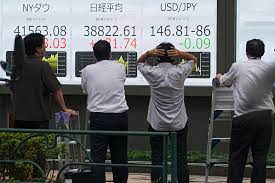
Asian markets experienced mixed trading today as investors kept a close watch on the upcoming U.S. jobs report. This report, which is highly anticipated, could provide crucial insights into the health of the U.S. economy and influence global market sentiment.
Market Performance Across Asia
The trading day saw varied performances across major Asian markets. In Tokyo, the Nikkei 225 edged lower, reflecting investor caution ahead of the U.S. jobs data. Meanwhile, Hong Kong’s Hang Seng Index experienced slight gains, driven by positive developments in the technology sector. In contrast, China’s Shanghai Composite remained relatively flat, as concerns over the country’s economic recovery continued to weigh on sentiment.
See Here:
Other regional markets, such as South Korea’s KOSPI and Australia’s ASX 200, also showed mixed results. While some sectors benefited from optimism over domestic growth, others lagged due to uncertainties surrounding global economic conditions.
Investor Focus on U.S. Jobs Report
The key focus for investors remains the U.S. jobs report, which is expected to offer critical insights into the labor market’s strength. The report is a significant indicator of economic health, as it can influence the Federal Reserve’s decisions on interest rates and monetary policy.
A strong jobs report could bolster confidence in the U.S. economy, potentially leading to tighter monetary policy. This scenario might result in a stronger U.S. dollar and could affect global trade and investment flows. Conversely, a weaker-than-expected report might prompt concerns about economic slowdown, leading to increased market volatility.
Impact on Currencies and Commodities
The mixed trading in Asian markets also had implications for currency and commodity markets. The Japanese yen strengthened slightly against the U.S. dollar as investors sought safe-haven assets ahead of the jobs report. Meanwhile, the Australian dollar remained stable, reflecting cautious optimism in the country’s economic outlook.
In the commodities market, oil prices fluctuated as traders balanced concerns about demand with expectations of supply constraints. Gold prices saw modest gains, driven by the uncertainty surrounding the U.S. jobs data and its potential impact on global markets.
Regional Economic Developments
In addition to the U.S. jobs report, regional economic developments also played a role in influencing market sentiment. In China, ongoing efforts to stimulate economic growth through fiscal and monetary measures continued to be a focus for investors. However, concerns about the effectiveness of these measures and the broader global economic environment persisted.
In Japan, the Bank of Japan’s monetary policy stance remained under scrutiny, with investors watching for any signs of changes in its approach. Meanwhile, in South Korea and Australia, economic data and corporate earnings reports provided mixed signals about the strength of their respective economies.
Conclusion
As Asian markets trade mixed, the anticipation of the U.S. jobs report looms large over global financial markets. The report’s findings will likely have a significant impact on investor sentiment and could drive market movements in the coming days. For now, investors remain cautious, balancing regional economic developments with the potential implications of key data from the United States





